So you’ve landed yourself a job at a festival? It won’t be quite like going as a customer, it’ll be a different experience.
Being part of the team that brings a festival to life can be good fun, but you need to be professional and behave responsibly.
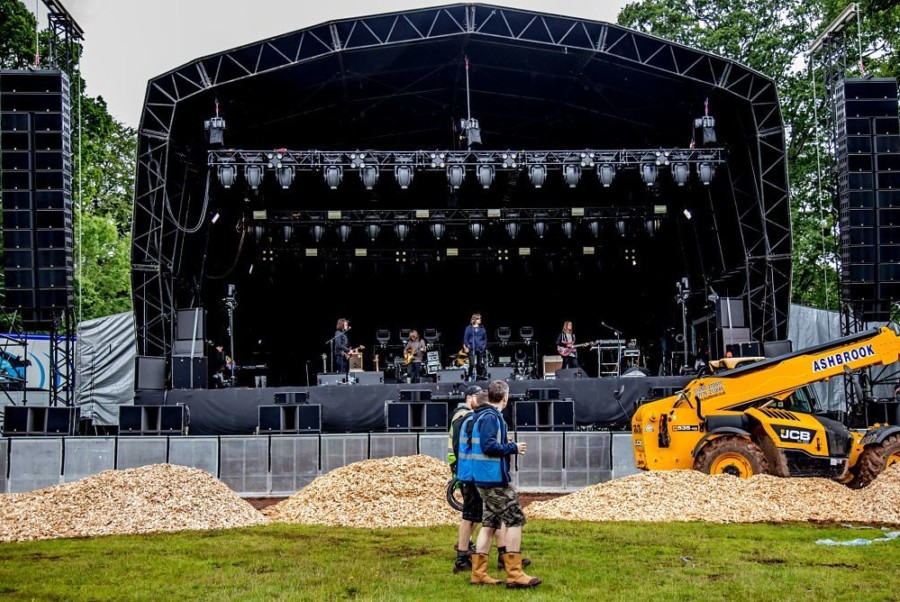
The Working Environment
If you’ve never been to a festival before, read about what to expect. Working at events can be exciting but also challenging at times.
- You will be outside in all weather.
- Shifts can be long and sometimes through the night.
- Living conditions are often cramped and noisy.
- You will be around customers who may be drunk and sometimes misbehaving!
As with any other job, you should make sure you understand what your responsibilities are, who your supervisor is and who to speak to if something goes wrong.
It is best to arrive on the day your employer suggests and follow their instructions for where to go. Bring the phone number of your festival contact with you; there can be hundreds of people working, so staff on gates or box offices might not be able to contact everyone.
You may have been hired directly by the festival or by another contractor. Either way, your employer should provide you with access to the following:
- Toilets
- Drinking water
- Washing facilities
- Rest area/shelter
- Changing facilities
- Rest breaks
- Access to food (you may have to pay for this yourself)
- First Aid
You will need to check whether you’ll have internet access and somewhere to charge your phone.
You should feel confident asking your manager how to access these things. A festival might feel like a more relaxed (and sometimes chaotic!) working environment, but you still need to look after yourself to be able to do your job safely.
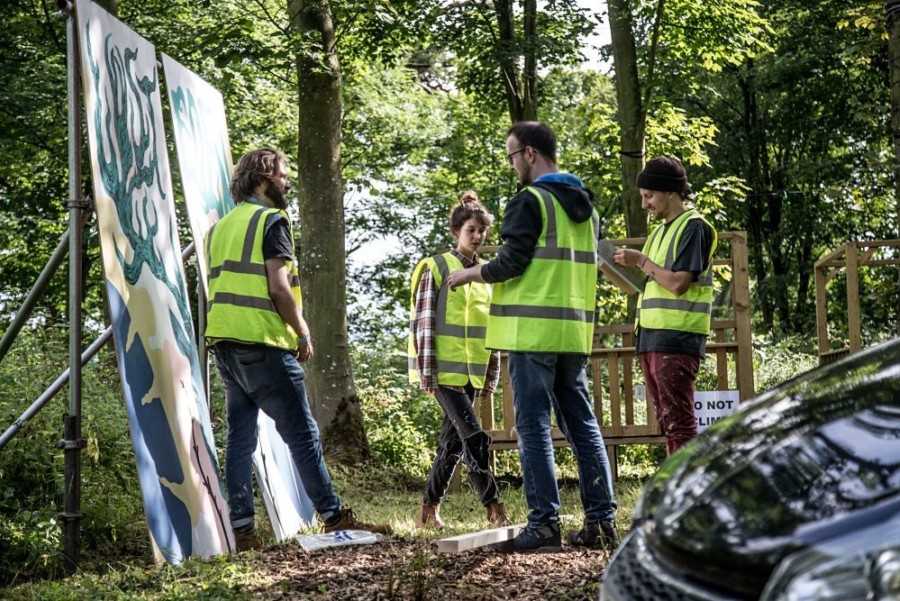
What To Bring
A good starting point is our Festival Kit List; plenty of warm layers, sturdy boots, waterproofs and a hat are a must when you’re working. Bring a travel towel and a wash bag with a hook to hang on the back of the shower door.
You may be at the festival for longer than customers, so make sure you bring enough changes of clothes as there may not be anywhere to do laundry. If the weather is bad it can be hard to dry wet, muddy clothes.
You should check beforehand if you will need any PPE (personal protective equipment) and whether you need to provide this yourself. For example, if you are working before the festival opens to the public, then you may need safety footwear or a hi-vis vest.
If you are working on a site away from where you live and have children or pets, you shouldn’t assume you can bring them along. Check with the organisers first to see if this is ok.
Read about how to keep yourself and your valuables safe at festivals.
Travel & Accommodation
You should check with your employer whether you need to make your own way to the festival or if you can use festival shuttle buses. You can read more about all things festival travel related here.
Most workers will stay on site at the festival. Ask before you go where you will be staying as you might need to bring your own camping gear.
Crew Camping
This is a separate area from the customer campsites. You’ll need a staff wrist band or accreditation to get in. You will usually need to bring your own tent so read more about all things camping related here. In crew camping people need to get sleep before working so try and keep noise to a minimum. You shouldn’t bring friends who aren’t working back there. If you want a tent drink after you finish your shift, visit your mates in the customer camp sites!
Bunkabins
If you’re lucky you might be offered a ‘Bunkabin’ which is a porta cabin with beds inside. You will probably have to share with other staff and you should check if you need to bring your own bedding.
Off-site accommodation
If you’re really lucky then you might be offered a room in a hotel or hostel off site. Again, you will probably have to share with other workers. You’ll also need to consider how you will get back and forth to the site for your shifts.
Remember that where you stay might be a long walk from where you are working so leave enough time to get across site. Read more about getting around site.
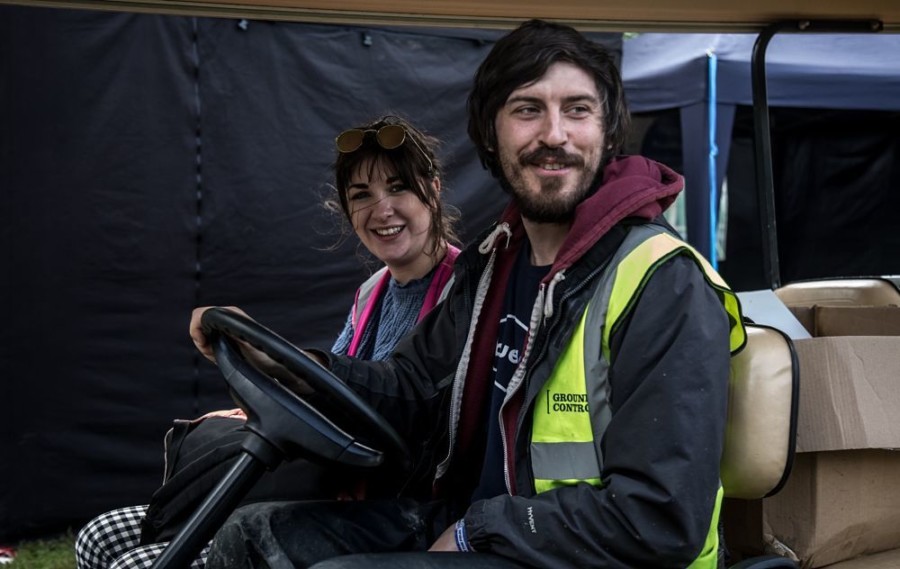
Vehicles & Driving
For the safety of everyone on a festival site vehicle movement (including cars, buggies, plant or any other vehicle) should always be kept to a minimum. If you do have to drive on site:
- respect the speed limit (usually 5mph);
- drive cautiously and be mindful of pedestrians;
- stick to allocated tracks and wherever possible stay off the grass especially if it’s wet and muddy;
- don’t overload buggies with extra passengers;
- never drive plant vehicles, such as forklifts or telehandlers, without the correct licence.
Toilets
The good news is that, as a worker, you may have access to staff toilets in back of house areas. The bad news is that all festival toilets, whether for workers or customers, tend to end up getting a bit grimy! Read more about how to cope with festival loos.
Staying Fresh
There should be washing facilities and sometimes showers available for staff to use in crew camping areas. The queues can get quite long, but when you’re there to work, it’s even more important to keep on top of your personal hygiene, particularly if you’re working in food outlets or bars. No one wants to buy their burger from someone stinking of body odour!
Food
Some festivals will provide workers with meals, others will expect you to pay for your own food. It’s good to check before you go what the catering provision will be so that you can plan.
Catering Vouchers
Catering vouchers can be exchanged for meals with food vendors in the festival. Vouchers can’t always be spent with all traders, so find out where you can use them. They will have a set value so you might need to subsidise them with cash if you want something more expensive.
Crew Catering
The crew catering tent is like a big canteen where there are sittings of breakfast, lunch and dinner. Crew catering vouchers can be exchanged for meals at the allotted times. Take a picture of the schedule when you arrive so you don’t miss your time slot!
If you prefer to cook at camp or need a special diet, check with your employer whether you can bring your own food. Think about how you will store food safely without risking food poisoning if you are there for a long time. Read about staying safe when using gas canisters and camping stoves.
If you do cook at camp make sure you get rid of your food waste in the correct way and recycle other waste wherever possible. A tidy camp is a happy camp!
If you have any medical related dietary requirements you should think about how you’ll cope with limited food options available at festivals and make sure you plan carefully.
Looking After Yourself
Don’t underestimate how tiring it can be working at a festival. You need to look after your mental and physical health to avoid exhaustion and make sure you can do your job safely.
- Get enough sleep.
- Eat regularly.
- Stay hydrated and drink plenty of water.
- Take enough breaks when you are working.
- Be sun smart, wear a hat and a high SPF sun cream.
- Wear waterproofs if it’s wet.
- Know who to speak to if you need help.
- Don’t burn the candle at both ends – you are there to work!
If you are unwell you can visit the Festival Medics who will be able to help. Most festivals also have a Welfare Team who are there if you need them. They are experienced, non-judgemental people who can give confidential advice about mental health, alcohol and other drugs, sexual health, and offer support if you need someone to talk to.
If you have any pre-existing medical conditions that require medication, don’t forget to bring this with you. If necessary, tell your employer or someone you are working with where to access it in an emergency. If it needs to be stored in a fridge, check with your employer before arriving how to arrange this.
Make sure that you know where the Medical and Welfare teams are located on site. This is also useful in case you spot customers who are struggling and may need help as well as for yourself.
Read more about looking after your general health and wellbeing at festivals.
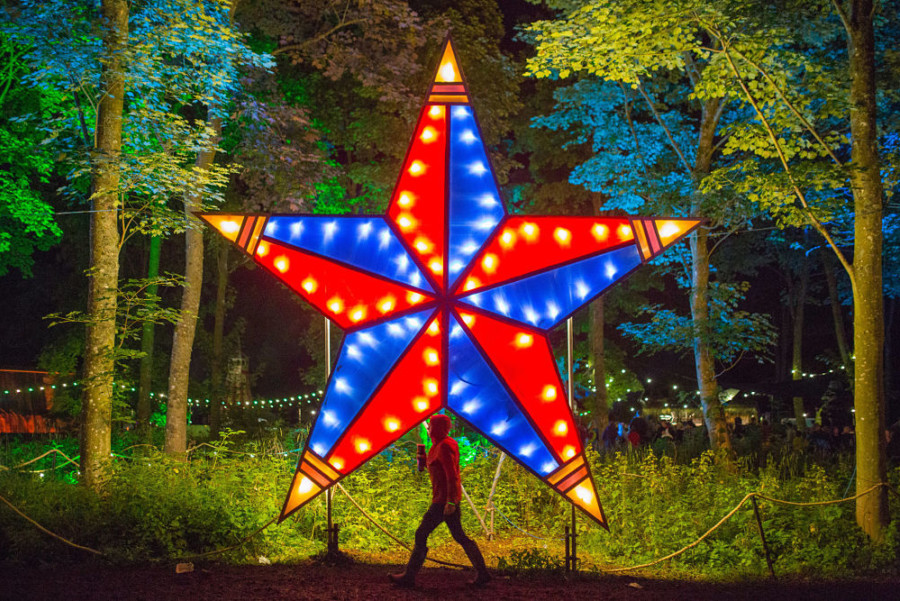
Mental Health
It is acknowledged that mental health can be an issue for people working on events. This includes existing problems that workers may bring with them, and also issues caused by and arising from working at events.
It can be a very intense and exhausting environment to work in and people may be working at a number of festivals in one summer.
If you are struggling with your mental health when working at a festival it is ok to ask for support from your manager, a member of the welfare team or a festival medic.
If you feel you are in crisis and would prefer to talk to someone anonymously over the telephone you can call the Samaritans for free on 116123 or the Music Support hotline on 0800 030 6789.
Time Off
Getting to watch music and enjoy the festival on your time off is one of the perks of working at an event but you need to be realistic about how much of this you’ll be able to do. You probably won’t be able to choose your time off, so it’s best not to arrive with a schedule of bands you think you’ll watch.
You will often be working long shifts, so it’s important to use some of your time off to rest and recuperate enough to avoid exhaustion.
It’s fine to meet friends and have a drink when you’re not working but don’t burn the candle at both ends. You need to turn up on time, sober and rested enough to work your shifts! Think about the time needed to sober up to be in a fit state for work and factor this in to your plans.
When you sign up to work at an event you agree to follow the site rules. This means that as a worker you should not take drugs, even when you aren’t on shift.
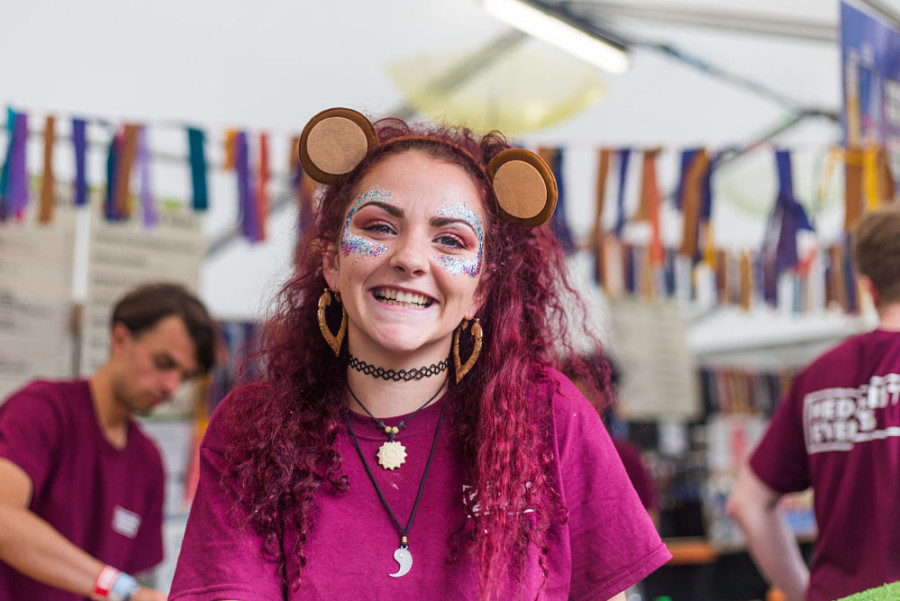
Safer Spaces
There is a rising movement globally to support positive change and acknowledge the experiences of those who are more at risk from incidents of sexual assault and harassment - typically, but not exclusively, women. Read more about Safer Spaces at festivals.
All Festivals have a zero-tolerance policy towards any kind of sexual assault or harassment. There is no evidence to suggest that more of these incidents take place at festivals, but organisers take this issue incredibly seriously in their planning and practices. These include the provision of welfare services, 24 hour security on campsites and arenas and close working relationships with police and other relevant agencies.
The festival environment can feel relaxed and more informal than other places you may have worked; you might be interacting with people who are drunk or intoxicated, but this does not mean that it is acceptable for anyone to feel objectified or harassed.
Event workers have a responsibility to help model a culture where everyone’s festival experience is valued and no one is made to feel uncomfortable. Over 100 festivals have signed up to the Association of Independent Festivals' Safer Spaces at Festivals Charter which states that all allegations of sexual harassment and violence will be taken seriously, acted upon and investigated.
If you experience any kind of sexual assault or harassment when working, you should report it immediately and feel confident that it will be taken very seriously.
You can report incidents to any of the following on site at events:
- Police Officer
- Member of the Security Team
- Welfare Staff
- Medics
What If A Customer Reports An Incident?
If a customer approaches you as a worker to report an incident of sexual assault or harassment, you should remain calm, listen to what they are telling you and be compassionate. Remember you are not a counsellor, so don't feel under pressure to offer advice.
You should explain that the event organisers take reports of this kind very seriously and ask if it is ok for you to escalate the incident to ensure they get the support they need.
If they are happy for you to do so, you should contact one of the people listed above immediately and explain what has happened. They should then escalate this to the event management team.
If someone reports an incident to you but then leaves before you are able to get them help, you should still report this and give as much detail as possible.
Remember you should treat this kind of incident as confidential and should not discuss it with your co-workers or friends.
If you receive a report from a customer which you find upsetting or feel you need to talk about, you can visit festival welfare who can offer confidential support and advice.
Be a Friendly Face in the Crowd
A festival is a small community and everyone should play a part in looking after the site and each other. When you are a worker you have a responsibility to report things that don’t seem right, to help the event run smoothly.
- If you see someone who is struggling, ask if they are ok and if necessary alert a member of the security team or a medic.
- If you spot someone unconscious and alone alert the medics immediately.
- If you spot a problem with the site infrastructure, for example a broken fence, don’t just ignore it! Ask a member of event staff with a radio to report it.
- If you see any scenario in which tensions are escalating, report it immediately to a member of the security team.
- If you witness any kind of sexual assault don’t be a bystander, report it immediately to a member of the security team.
Read about how to help keep festival sites safe and reduce crime.
General Behaviour
A festival can feel like a relaxed working environment but you still need to behave in a professional and responsible way. When you are wearing branded crew clothes or even just hi-vis and work wear, you are recognisable as someone associated with the event and you should be aware of how behaviour could be interpreted.
- Always be respectful of customers and other staff.
- Look after any equipment or kit you are given and return it when you leave.
- Respect the land and the site.
- Where possible recycle and follow these rules to be a green festival goer.
- If you’re having a drink when you’re not working, it’s better to change out of any work wear and branded clothes.
- Be mindful of discussing anything on or off site that could be considered confidential or an inappropriate story to share. You don’t know who could be listening!
Social Media
You might want to share your festival experience with your mates on social media but think carefully about what you post. Things you shouldn’t share include:
- pictures of any staff accreditation including laminates and wristbands;
- pictures of control rooms or staff meetings;
- details of artists’ riders or behaviour;
- stories about things going wrong – no matter how funny they might seem!
- anything confidential or that could reflect badly on the event.
Useful Links
Questions?
All festivals have slightly different rules. If you have any questions you should contact the organisers of the event that you are going to. Visit the event website for details of how to get in touch.
Festival Safe is aimed at people heading to UK festivals. Much of the information you'll find here will be useful wherever your event is being held, but if you are heading to an overseas event remember that rules, and in particular the law, can be different in other countries.

